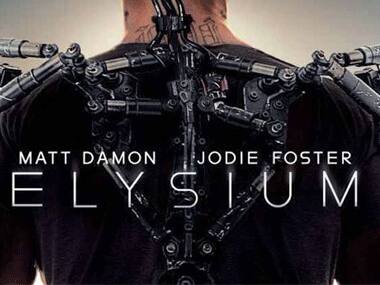By Suprateek Chatterjee Damn you, Hans Zimmer. Don’t get me wrong. I’m a huge fan of the Oscar-winning German composer, the man behind the sweeping orchestral scores from more than 100 films, including The Lion King (1994) and Gladiator (2000). But it is his score from 2009’s Inception that I have a gripe against. Not because it was bad, but because it has inspired a series of copycat scores. I’m talking specifically about that now-iconic cue of metronomic blasts of French horns that appear with alarming regularity in practically every action movie, even when the score isn’t by Zimmer. You know the sound: it goes something like ‘BHWAAAAH’ and is a sign that Something Very Grave Is About To Happen But You Should Be Thrilled About It. It’s become so commonplace that it was even used in the recent Zanjeer remake. Elysium, whose musical score is by newcomer Ryan Amon, overuses this cue and many others from Zimmer’s oeuvre (like his trademark staccato violin riffs from The Dark Knight trilogy). And it’s symptomatic of the problem with Elysium in general: it is just another action flick. [caption id=“attachment_1135045” align=“alignleft” width=“380”]  Courtesy: ibn live[/caption] Despite this being the long-awaited second feature from South African director Neill Blomkamp, who burst into the scene with the inventive sci-fi drama District 9 (2009), and backed by a big budget and star power in the form of Matt Damon, Elysium does little to distinguish itself from the parade of other action-packed, CGI-driven blockbusters. Set in Los Angeles in 2154, Elysium presents the first-world city as a third-world nightmare. Poverty, crime and disease are rampant. Garbage and sewage line its filthy streets. Basically, it is an entire megalopolis modelled upon Mumbai’s Dharavi. This is how 99% of humanity lives in the world of Elysium. One of this 99% is protagonist Max Da Costa (Damon), a former convict who makes a living as an exploited factory worker. The other 1% lives on a satellite in space, fitted with every conceivable luxury, named Elysium. Aside from clean air and greenery, citizens of Elysium also have access to a miraculous piece of technology called the MedBay, which can heal any injury and cure any disease in seconds. After Max suffers a deadly dose of radiation and is told by a robot he will die in five days, he approaches Spider (Brazillian actor Wagner Moura), a former criminal associate who facilitates illegal migration to Elysium. Unenthusiastic to die in five days, Max wants to smuggle himself into Elysium and use the MedBay to cure himself. To enable this, Max is surgically operated upon and given a robotic exoskeleton and asked to gain access to some critical information that will, obviously, help save all of humanity. In case the floating Elysium reminded you of PIXAR’s brilliant Wall-E (2008), you’re onto something. In Wall-E, the themes of human greed and laziness were explored subtly against the backdrop of a touching love story between two robots. In Elysium, the politics are straightforward to the point of being facile. Yes, Blomkamp, we get that the world and your film is all about material inequality. Yes, we get the none too subtle references to anti-immigration laws (it was explored much more effectively in the Clive-Owen-starrer Children Of Men). Unfortunately, we feel absolutely nothing for Blomkamp’s characters. Even the simplest trope of a love story — between Max and his childhood sweetheart Frey (Alice Braga) — barely registers. The problem is Blomkamp’s writing, which oscillates only between expository and simplistic with nary a memorable moment. Think of every great sci-fi movie you’ve ever seen and you’ll probably remember at least two great scenes involving human characters – a visual joke, a lighter moment or a heartwarming connection. Elysium is influenced by franchises like Transformers, with wall-to-wall action and very little heart. The performances by actors as seasoned as Damon and Braga are strictly competent, let down as they are by the script. The standout performances come from Moura and South African actor Sharlto Copley (the affable protagonist of District 9), who plays a cold-blooded mercenary named Kruger. District 9 was made at a third of the reported $115 million that Elysium cost, and it’s evident that this money largely went towards the production design and funding special effects. In that regard, it was money well spent. One now hopes that, for his next film, Blomkamp spends a little more time on his script. (Suprateek Chatterjee is editor of Visual Disobedience, a community for emerging indie artists, and a freelance writer. In his spare time, he likes to compose music with his electro-rock band Vega Massive and his Twitter handle is @SupraMario.)
The performances by actors as seasoned as Damon and Braga are strictly competent, let down as they are by the script.
Advertisement
End of Article
Written by FP Archives
see more


)
)
)
)
)
)
)
)
)



